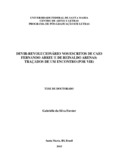| dc.creator | Forster, Gabrielle da Silva | |
| dc.date.accessioned | 2015-10-21 | |
| dc.date.available | 2015-10-21 | |
| dc.date.issued | 2015-02-06 | |
| dc.identifier.citation | FORSTER, Gabrielle da Silva. REVOLUTIONARY BECOMING IN THE WRITINGS OF CAIO FERNANDO ABREU AND REINALDO ARENAS: TRACES OF AN ENCOUNTER (TO COME). 2015. 218 f. Tese (Doutorado em Letras) - Universidade Federal de Santa Maria, Santa Maria, 2015. | por |
| dc.identifier.uri | http://repositorio.ufsm.br/handle/1/3998 | |
| dc.description.abstract | A dialogic reading between Caio Fernando Abreu and Reinaldo Arenas based on the vitalist and enhanced dimension of their texts is presented here, aiming at articulating a state of uneasiness with the resistant nature that the sight of new existential and relational possibilities opens inside and outside the fictional space. To do so, transgressions as regard the content and form in Arenas and Abreu s fiction were sought - mainly by following the connections existing among the flexibility of Foucault s fold , the new division of the sensible engendered by the political dimension of art in accordance with Ranciere s conception, and the nomad impulse originated by the notion of war machine conceived by Deleuze and Guatarri. Along the trajectory, the revolutionary concept of becoming ; forged through and by the fictional corpus, overcame the dilemma among antagonistic positions presented by the inherent critical view of the selected works in relation to their context of production. By so doing, it was possible to bring to light a transforming way of feeling: one that may alter the existing forms of life and, ultimately, reinvent them. Through different aesthetic devices, the works of fiction studied deviate obstructing centers to allow a becoming to be forseen: unfinished and inoperative, yet, an embryo for a rare community to be thought of, and its alterity restored from its intrinsic expropriation. | eng |
| dc.description.sponsorship | Coordenação de Aperfeiçoamento de Pessoal de Nível Superior | |
| dc.format | application/pdf | por |
| dc.language | por | por |
| dc.publisher | Universidade Federal de Santa Maria | por |
| dc.rights | Acesso Aberto | por |
| dc.subject | Caio Fernando Abreu | por |
| dc.subject | Reinaldo Arenas | por |
| dc.subject | Devir-revolucionário | por |
| dc.subject | Caio Fernando Abreu | eng |
| dc.subject | Reinaldo Arenas | eng |
| dc.subject | Revolutionary becoming | eng |
| dc.title | Devir-revolucionário nos escritos de Caio Fernando Abreu e de Reinaldo Arenas: traçados de um encontro (por vir) | por |
| dc.title.alternative | Revolutionary becoming in the writings of Caio Fernando Abreu and Reinaldo Arenas: traces of an encounter (to come) | eng |
| dc.type | Tese | por |
| dc.description.resumo | Leitura dialógica estabelecida entre escritos de Caio Fernando Abreu e de Reinaldo Arenas que, pautada na dimensão vitalista potencializada em seus textos, visa articular a circulação do desassossego com o caráter resistente que o vislumbre de novas possibilidades existenciais e relacionais abre dentro e fora do espaço ficcional. Para tanto e apoiada, sobretudo, nas conexões entre a maleabilidade da dobra foucaultiana, a redivisão do sensível engendrada pela dimensão política da arte conforme concebe Rancière e o impulso nômade da noção de máquina de guerra deleuzo-guattariana buscou-se perscrutar transgressões, no que tange ao conteúdo e à forma, ativadas tanto na literatura areniana quanto na caiofernandiana. Com o percurso, delineou-se que o devir-revolucionário engendrado no (e pelo) corpus ficcional ultrapassava o embate entre posições antagônicas, visível na postura crítica das obras selecionadas em relação ao contexto de produção das mesmas, para suscitar uma transformação afetiva enquanto possível desclassificador de formas-de-vida que se mostram insuficientes, forçando, em consequência, à reinvenção. Por diferentes estratégias estéticas as ficções estudadas vazam focos obstrutores em um deslize que se estende a um reclamado por vir: inacabado e inoperante, gérmen de uma inusitada comunidade, cuja discussão devolve à alteridade sua intrínseca expropriação. | por |
| dc.contributor.advisor1 | Silva, Vera Lucia Lenz Vianna da | |
| dc.contributor.advisor1Lattes | http://buscatextual.cnpq.br/buscatextual/visualizacv.do?id=K4777668Y5 | por |
| dc.contributor.referee1 | Leilla, Alessandra Leila Borges Gomes állex | |
| dc.contributor.referee1Lattes | http://lattes.cnpq.br/3529681209301146 | por |
| dc.contributor.referee2 | Silva, Marcia Ivana de Lima e | |
| dc.contributor.referee2Lattes | http://buscatextual.cnpq.br/buscatextual/visualizacv.do?id=K4785246Y1 | por |
| dc.contributor.referee3 | Farias, Vera Elizabeth Prola | |
| dc.contributor.referee3Lattes | http://buscatextual.cnpq.br/buscatextual/visualizacv.do?id=K4700479U3 | por |
| dc.contributor.referee4 | Umbach, Rosani úrsula Ketzer | |
| dc.contributor.referee4Lattes | http://buscatextual.cnpq.br/buscatextual/visualizacv.do?id=K4766005J9 | por |
| dc.creator.Lattes | http://lattes.cnpq.br/8590017340384343 | por |
| dc.publisher.country | BR | por |
| dc.publisher.department | Letras | por |
| dc.publisher.initials | UFSM | por |
| dc.publisher.program | Programa de Pós-Graduação em Letras | por |
| dc.subject.cnpq | CNPQ::LINGUISTICA, LETRAS E ARTES::LETRAS | por |


